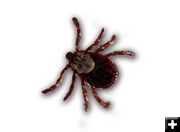

Tick
Tick (shown many times actual size). Pinedale Online file photo.
|
|
Ticks and Diseases
Department of Health warns about Tick-borne diseases
by Wyoming Department of Health
May 21, 2007
The Wyoming Department of Health is warning residents to take precautions to avoid infection with tick-borne diseases, including Rocky Mountain spotted fever (RMSF), tularemia and Colorado tick fever.
Each disease is found in Wyoming and is typically transmitted by the bite of an infected tick. Recently, there have been four cases of human RMSF reported to the Wyoming Department of Health along with unconfirmed reports of possible tularemia among sheep handlers. The department is also hearing reports of rabbit die-offs in the state, which may indicate increased tularemia activity.
Initial RMSF symptoms may include fever, nausea, vomiting, muscle pain, lack of appetite and severe headache. Later signs and symptoms may include rash, abdominal pain, joint pain and diarrhea. Often, RMSF patients require hospitalization.
Illness with tularemia can include fever, swollen and painful lymph glands, inflamed eyes, sore throat, mouth sores, skin ulcers, and diarrhea. If the bacteria are inhaled, symptoms can include abrupt onset of fever, chills, headache, muscle aches, joint pain, dry cough and progressive weakness and pneumonia.
Colorado tick fever usually causes fever, headache, muscle and joint pain, and, occasionally, a rash.
“People who become ill after an insect or tick bite, or after handling a sick or dead animal should definitely contact their healthcare provider,” said Dr. Dan O’Leary, acting state public health veterinarian.
To avoid these diseases, limiting exposure to ticks is important. Tick populations usually peak during the spring months, and humans become exposed to ticks from visiting brushy habitats or through animal handling.
People exposed to possibly tick-infested areas should consider the following recommendations:
* Wear light-colored clothing to make it easier to see ticks crawling on clothing.
* Tuck pant legs into socks.
* Apply insect repellents such as those containing DEET and picaradin to discourage tick attachment.
* Upon return from potentially tick-infested areas, search entire body for ticks and remove them.
* Parents should check their children for ticks, especially in the hair.
* Pets can carry ticks into the household and should also be examined. Veterinarians can recommend tick control products for pets.
Tularemia, also known as “rabbit fever” or “deer fly fever,” frequently affects rabbits, hares and rodents and has been associated with rabbit die-offs. Other mammals, including domestic animals, can also become infected. In addition to tick bites, people may acquire tularemia when bit by infected deer flies, horse flies or mosquitoes. It can also be transmitted by handling infected animals, or through ingestion or contact with untreated, contaminated water or insufficiently cooked meat.
O’Leary suggested additional precautions that can help reduce the risk of tularemia infection:
* Avoid bathing, swimming or working in untreated water and avoid drinking untreated water.
* Avoid handling rabbits, squirrels or other animals that appear sick.
* Wear rubber gloves when skinning animals, especially rabbits and squirrels; skin animals in a well-ventilated area.
* Wash hands thoroughly with soap and water after handling sick or dead animals.
* Cook meat thoroughly before eating, especially rabbit and squirrel.
The diagnosis of tick-borne diseases is confirmed through blood tests ordered by a physician. Healthcare providers should report any suspected or confirmed cases of tick-borne disease to the Wyoming Department of Health by calling 307-777-3593.
|
